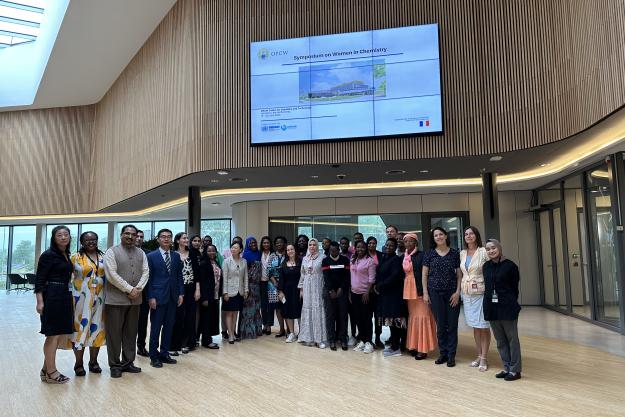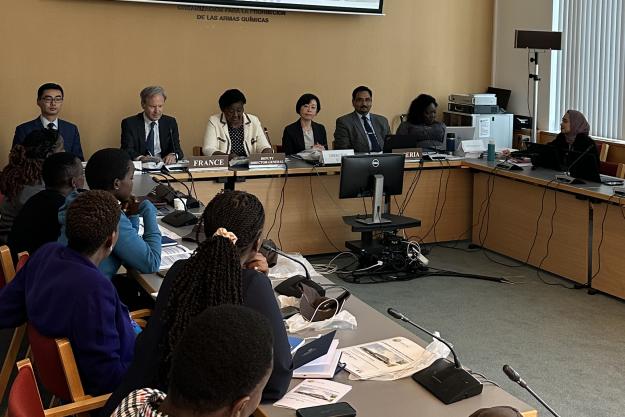
THE HAGUE, Netherlands—29 June 2023—The Organisation for the Prohibition of Chemical Weapons (OPCW) concluded its Annual Symposium on Women in Chemistry at the OPCW Centre for Chemistry and Technology (ChemTech Centre) held from 19-20 June. The event, organised in close cooperation with the United Nations Interregional Crime and Justice Research Institute (UNICRI) and the United Nations Institute for Disarmament Research (UNIDIR), aimed to foster gender equality and diversity in the field of chemistry. The theme for this year’s symposium was “Empowering Women and Promoting Gender Diversity in the Peaceful Uses of Chemistry and Chemical Security”. The symposium was supported by the voluntary contribution from the French Republic.
The two-day event brought together experts, scientists, and researchers from across the globe to discuss and address the challenges faced by women in science, particularly in the field of chemistry. Attendees explored various strategies to promote gender balance, enhance opportunities, and overcome barriers that hinder women’s progress in scientific fields. They highlighted the important contributions made by women to the peaceful uses of chemistry and underscored the invaluable role of women in advancing scientific knowledge and technological advancements. Participating experts shared their experiences in identifying opportunities for career growth and training and highlighted the added value of gender diversity in chemistry.
In her opening remarks, the OPCW Deputy Director-General, Ambassador Odette Melono, stressed the significance of fostering an environment that encourages equal participation and representation in scientific fields. She called for “a more inclusive scientific community, where every aspiring scientist, regardless of gender, is provided with the opportunity to contribute, lead and make a difference.” She also welcomed the fact that this year’s Symposium was held at the newly inaugurated ChemTech Centre. The Centre serves as flagship endeavour for the OPCW to bolster its training, research, capacity-building, and operational capabilities and to further expand its activities related to women studying and working in STEM.
Ambassador François Alabrune, Permanent Representative of France to the OPCW, highlighted the role of female chemists in achieving our common mission to rid the world of chemical weapons and promote the peaceful uses of chemistry. He noted that: “It is only if we take into account their perspective, experience and skills that we will be able to tackle the complex nature of chemical threats and thus achieve a safer world.” He further added that France is proud to support the Symposium, which plays a crucial role in advancing the issue of gender equality and achieving greater women’s involvement and representation in the field of chemical safety and security.
The Symposium featured interactive panel discussions and presentations that focused on a wide range of topics, including women’s empowerment in scientific research, strategies to enhance women’s participation in chemistry-related professions, and the importance of mentorship and networking. Furthermore, the event emphasised the need to address unconscious biases and gender stereotypes that persist within the scientific community.
The Symposium also discussed and deliberated on the Compendium of Best Practices on the Engagement and Advancement of Women in Chemical Safety and Security, which was a result of an EU-funded research last year, jointly conducted by OPCW and UNICRI, aimed at identifying best practices in recruiting, training, and promoting women in chemistry.
The event was attended by 17 in-person participants from 9 OPCW African Member States: Algeria, Cameroon, Côte d’Ivoire, Kenya, Libya, Mauritius, South Africa, Uganda and Zimbabwe. 16 participants joined online from the following 9 OPCW Member States: Bulgaria, Cameroon, Côte d’Ivoire, Germany, Iraq, Kenya, Peru, Nicaragua, and Uganda.

Background
OPCW’s annual Women in Chemistry Symposium attracts talented women from government, industry and academia to illustrate the strength and depth of contributions women have made to the peaceful uses of chemistry.
As the implementing body for the Chemical Weapons Convention, the OPCW, with its 193 Member States, oversees the global endeavour to permanently eliminate chemical weapons. Since the Convention’s entry into force in 1997, it is the most successful disarmament treaty eliminating an entire class of weapons of mass destruction.
Over 99% of all declared chemical weapon stockpiles have been destroyed under OPCW verification. For its extensive efforts in eliminating chemical weapons, the OPCW received the 2013 Nobel Peace Prize.
